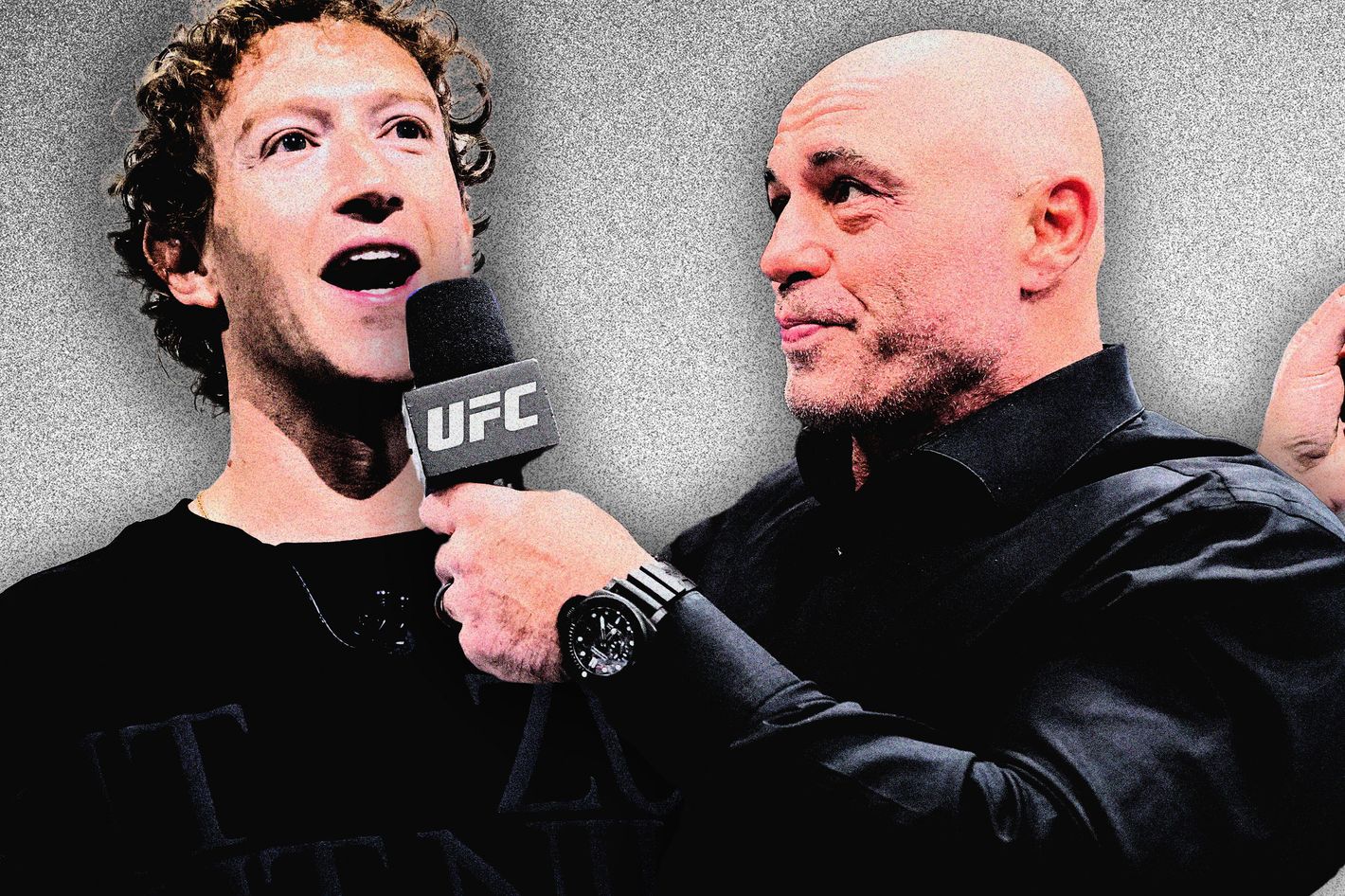Photo-Illustration: Intelligencer; Photos: Getty Images
There is little to Mark Zuckerberg beyond the desire to make money. Values have been grafted onto him over the decades, and he has espoused various opinions to appease whomever holds power at a particular time. He is one of the richest men in human history, and he is deadly serious in his commitment to protect his own bottom line. His signature product, Facebook, is slowly rotting away, but he’s also got Instagram and WhatsApp — neither invented by him, merely strategically acquired — in his arsenal.
His announcement that Facebook would be loosening its content-moderation policies and shutting down its DEI programs can be viewed, in every sense, as a capitulation to Donald Trump, the once and future president. On Joe Rogan’s podcast, Zuckerberg made it clear he was ready to do business: In his peculiar black T-shirt and gold chain — like a balky child of the suburbs straining for some nebulous urban cred — he railed against the Biden administration and affirmed, for the president-elect who might be watching, that Facebook was no longer a left-coded company. The Obama years were long over, as was the muddle that came after. This was UFC Zuck, Rogan Zuck, reporting for duty. Our oligarchs are getting stranger all the time.
Still, Zuckerberg wasn’t entirely wrong. In fact, he was right for the wrong reasons. Content moderation has, largely, been a failure on social media, and some of it was driven by a moral panic over Trump’s shock victory in 2016. The upsurge of “misininformation” and “disinformation” experts did little to build trust in mainstream institutions, and fact-checks, initiated by news organizations and other outside organizations, did nothing to quell actual conspiracy theories.
The reality is that fact-checks and moderation can fail — and when they do, the misses are egregious. The lab-leak theory of COVID’s origin was initially dismissed as “fringe” and virtually impossible in 2020, even as scientists fiercely debated the topic. Facebook itself, along with the old Twitter, suppressed the New York Post’s articles about the Hunter Biden laptop story, though the reporting was legitimate. The Biden administration ultimately leaned on Zuckerberg to take down information that was true, including that COVID vaccines, while effective, could cause side effects. Moderators, meanwhile, were policing a platform used by billions of people, struggling to differentiate between satire and actual falsehoods, obscuring what should have been protected speech.
Zuckerberg told Rogan he was worried about “becoming this sort of decider of what is true in the world.” He has every right to worry. Social-media platforms have been our de facto public squares for more than a decade. This has prompted a fraught, if unresolvable, debate over what exactly to do about how we behave online. There aren’t easy answers.
The many advocates for more aggressive fact-checking and moderating online must concede that, eight years into the Trump era — four years as president and four years looming over the political system as a candidate — their approach cannot achieve their desired ends. The internet is simply too large to be tamed, and speech regulation cannot successfully chase away lies or halt the advance of politicians who propagate them. Europe, with its far more restrictive speech laws — in many nations, there is no equivalent of broad First Amendment protections — hasn’t beaten back the far right. Alternative für Deutschland is on the march in Germany, Marine Le Pen remains a force in France, and Herbert Kickl of Austria’s Freedom Party, which was founded by Nazis, might be on the verge of becoming the next chancellor.
Though speech-moderation policies were not framed in explicitly partisan terms, the fact-checkers, as Nate Silver has pointed out, have tended to be left-leaning. The industry exploded, after all, when liberals, many of them college educated, felt great alarm over Trump’s rise and sought to blame Facebook, among other outside actors, for an election victory that seemed so improbable. If Facebook was, and remains, a font for nonsense and lies, it was always foolhardy to explain Trump’s appeal through the lens of one platform. The American electorate is enormous and multifarious, and as widespread as Facebook became in the 2010s, Trump’s success could not be attributable to a bunch of voters duped by Russian bots. Since 2016, Facebook’s influence has waned — relatively few Americans under 40 use it any longer — and Trump has only continued to grow his vote share. As obsequious as Zuckerberg might be, he did not create Trump or the MAGA movement, and it’s best that he retreats from a heavy-handed moderation policy he was never much capable of managing anyway.
What will replace moderation? Elon Musk has corrupted X, formerly known as Twitter, but he deserves credit for introducing the Community Notes feature. As crowd-sourced moderation, it is surprisingly effective, equivalent to a quick-hit Wikipedia that performs the truth-telling task adequately. More important, news organizations can continue to do their job and perform fact-checks as they always have in the years before Trump rose to power. They can publish accurate, rigorously reported stories and explainers and be a source for credible information. Of course, many of them do this already.
Over the long term, lies and bad information can be beaten back with better information in the communities that need it most. Many counties across America are effectively news deserts, bereft of newspapers and websites that pay reporters to regularly gather information. Nonprofits can fill some of these gaps. Even better would be a national, federal commitment to funding local news of the likes found in other countries. Some states have stepped up already. Doing it this way is a much stronger plan than begging Zuckerberg to do better.

